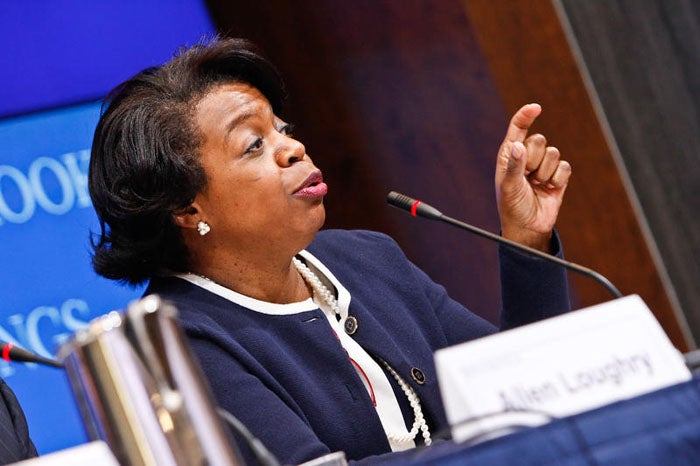Associate Justice Cheri Beasley named new chief justice
Published 7:44 pm Tuesday, February 12, 2019

- Associate Supreme Court Justice Sheri Beasley has been appointed the new chief justice by Gov. Roy Cooper.
By Gary D. Robertson
Associated Press
RALEIGH — Democratic Gov. Roy Cooper’s decision Tuesday to elevate N.C. Supreme Court Associate Justice Cheri Beasley to chief justice led to rare public criticism from a Republican judicial colleague who contends that tradition put him in line for the post.
Beasley, a former trial judge and Court of Appeals judge first named to the state’s highest court in 2012, will be the first African-American woman to hold the job.
She is Cooper’s choice to succeed Chief Justice Mark Martin, who is resigning Feb. 28 to lead the Regent University law school in Virginia.
The chief justice is also considered the head of the judicial branch, with more than 6,000 employees and judicial officials and a more than half-billion-dollar budget.
“Justice Beasley is the right person at the right time,” Cooper said at an Executive Mansion news conference with Beasley.
The governor cited her varied legal experience.
Like Cooper, Beasley is a registered Democrat, one of five currently on the seven-member court. Beasley’s appointment goes through the end of 2020.
The chief justice’s seat now will be on next year’s ballot for a full eight-year term, and Beasley said she plans to run for it.
Cooper’s choice does not follow the tradition of the governor filling a vacant chief justice position with the most veteran justice, who over the decades has usually been someone from the governor’s party. In this case, it was a registered Republican — Associate Justice Paul Newby, who has been on the court since 2005.
Martin is also a Republican.
Newby, who now intends to run for chief justice next year, said in a news release that Cooper “decided to place raw partisan politics over a nonpartisan judiciary by refusing to honor” the tradition that would have made him chief justice.
“The governor’s decision further erodes public trust and confidence in a fair judiciary, free from partisan manipulation,” he said.
Cooper’s office didn’t immediately respond to Newby’s statement.
Republicans had urged Cooper to choose Newby. Supreme Court races had been officially nonpartisan elections until a new law was approved in late 2016 — just after registered Democrats regained a majority on the court.
The justices have ruled this decade in politically charged decisions involving redistricting and Republican laws that eroded Cooper’s powers.
With Tuesday’s appointment, Cooper also bypassed the longest-serving Democrat in Associate Justice Robin Hudson. State law requires her to step down in early 2024, at age 72.
Beasley turns 53 on Thursday. Newby is 63.
The governor told reporters he believes each of the remaining six justices had the ability to be chief justice and said he even considered people not currently on the court.
In an interview, Newby said the tradition of the senior associate justice moving up to chief justice goes back more than 100 years. He knows of one exception — Republican Gov. Jim Martin appointed Associate Justice Rhoda Billings as chief justice in 1986 after she had been on the court for a year. The elevation of Billings, who lost her election later that year, was an aberration, Newby said.
By Cooper picking a chief justice from the current court, three of the seven seats will be on the 2020 ballot — chief justice, Newby’s current position and the associate justice seat about to become vacant with Beasley’s elevation. Cooper gets to fill the Beasley vacancy, too, through the end of next year.
As for Beasley, the historic significance of her elevation wasn’t lost on her, especially during Black History Month. She said she hopes her service will inspire young girls “to have a sense of promise and hope for their futures.”
“I’m excited about the fact that North Carolina has moved forward, that we do have a diverse court, and it’s so important that people feel good and have the confidence in the work that we do,” Beasley said.
A Tennessee native, Beasley served in the Cumberland County public defender’s office beginning in the mid-1990s and became a local District Court judge there in 1999. She was elected to the 15-member intermediate-level Court of Appeals in 2008.
Beasley was appointed to the Supreme Court by then-Gov. Beverly Perdue in 2012. She was elected to a full eight-year term in 2014.



